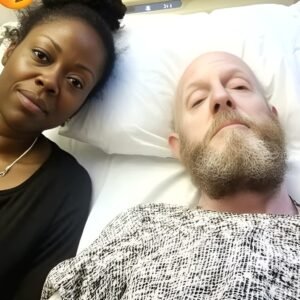“Stage four cancer… just weeks to live…” Those words reverberated in my mind as my world crumbled around me. My husband was dying, and the diagnosis felt so cold and final that I was left utterly heartbroken.
When we met with Dr. Matthews regarding Eric’s condition, his expression spoke volumes. I sensed that something was terribly amiss. That’s when he delivered the devastating news: Eric had stage four cancer and only weeks to live.
The impact of that news was overwhelming. Eric had to remain in the hospital, and in the days that followed, I spent nearly all my time by his side, trying to be strong for him and reassuring him that everything would be alright.
The thought of losing Eric brought me to tears, but the doctor advised me to brace myself for the worst.
One day, feeling the weight of despair, I stepped outside for a breath of fresh air and found a bench to sit on. That’s when she appeared: a nurse in her late 40s, dressed in navy scrubs and worn shoes that hinted at long hours on her feet. She took a seat next to me.
“Set up a camera in his room,” she whispered. “He’s not dying.”
“What!?” I gasped, taken aback. “What do you mean?”
“Just trust me. You deserve to know the truth,” she insisted.
And just like that, she vanished.
Her words planted a seed of doubt in my mind. I was torn between trusting my husband and invading his privacy. Eventually, I convinced myself that if there was any truth to her claim, I had to find out.
That evening, as I entered my credit card information and clicked “order,” my hands shook. After purchasing the small camera, I whispered, “I’m sorry,” unsure if I was apologizing to Eric or to myself.
Two days later, when Eric was scheduled for a CT scan, I went to his room and set up the camera.
I had no idea what to expect, but the next morning, I watched the footage.
What I saw shattered me. A woman in a sleek leather coat entered Eric’s room, and he sprang out of bed. The unbearable pain he had described seemed to vanish the moment he saw her.
They embraced and kissed, their body language intimate and familiar. I couldn’t hear their conversation, but I saw her hand him some papers, which he tucked under his mattress.
All this time, I believed my husband was dying, but he was with someone else, scheming behind my back. I knew I needed concrete proof of their plans, so that night, I stayed at the hospital without informing him.
Around 9 PM, the woman returned, striding down the hall with the confidence of someone who owned the place. When she entered Eric’s room, I positioned myself by the door and listened. What I overheard was the ultimate betrayal—something I never expected from the man I had been married to for 15 years.
Their plan was to fake his death. Once he was declared dead, the insurance money would be funneled offshore.
“This was too easy,” Eric chuckled. “You should’ve seen my wife today. She’s already planning my funeral. So concerned and loving, I almost feel sorry for her. Poor thing.” He added, “And I have to admit, Dr. Matthews played his part well, although his fake diagnosis cost me a fortune.”
I was devastated. His cruel words cut deeper than I could have imagined.
Fortunately, I had recorded their conversation on my phone, ready to expose him.
The next day, I called everyone I knew—family, friends, and colleagues. I told them Eric’s condition had worsened and that he wanted everyone to come to the hospital for one last visit. Then I went to his room and waited. As the people I had contacted began to arrive, Eric’s face turned pale. He sensed something was off.
Once everyone was gathered, I said, “Before you say your final goodbyes, there’s something you need to know about Eric.”
He looked at me, bewildered. “Diana, what are you doing? What’s happening?”
I didn’t respond. Instead, I played the recording.
Gasps of shock filled the room as his family and friends processed the betrayal. His mother began to cry, “Oh, Eric, how could you do this to us? To your wife?”
She was so overwhelmed that she nearly collapsed.
“Don’t worry, honey,” I said. “The police are on their way.”
In that moment, I saw Eric’s mistress attempt to flee. But she didn’t make it to the elevator before being arrested, along with my husband, whom I had believed was dying, and Dr. Matthews.
The following day, I filed for divorce, relieved that I hadn’t fallen victim to my husband’s cruel deception.
Feeling a sense of peace, I returned to the bench outside the hospital. After a while, the nurse who had warned me appeared. I thanked her for saving me from betrayal, and she explained that she had overheard Eric speaking to his mistress during a night shift.
“You saved me from a different kind of grief,” I said.
Losing my husband—not to cancer, but to his lies—turned out to be the best thing that ever happened to me.
